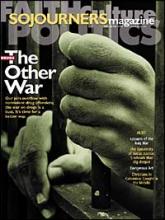How does a suburban Christian college educate students to meet the needs of a city? Eastern University wasn't satisfied to address this question through the usual means of most evangelical schools—an occasional service-learning trip here, a seminar from an "urban representative" there. Instead, a group of visionaries relocated from its suburban main campus to the heart of Philadelphia and set up shop, first as the Institute for Urban Studies in 1999, then as the Campolo School for Social Change (CSSC) in 2001.
Named for fiery activist-preacher Tony Campolo, a professor emeritus at Eastern, the graduate school is structured to deliver its message, as Dean Vivian Nix-Early puts it, "incarnationally." That means students learn not only through core curriculum on youth leadership, counseling, social policy, and economic development, but through field-intensive research and interdisciplinary action. Students and faculty alike come to view "the city as text," hitting the streets to learn from people who live there about the issues facing their neighborhoods, such as homelessness, health care, and education. And while CSSC has "covenanted" with two Philadelphia neighborhoods to encourage transformation from the inside, the school's vision stretches far beyond city limits. Nix-Early sees CSSC's mission as a global one: "The school exists to prepare Christian agents of change—compassionate professionals and activist scholars—to use their professions and lives to transform urban communities around the world." —Kate Bowman
Kate Bowman is news/Internet assistant at Sojourners. The Campolo School for Social Change at Eastern University, 990 Buttonwood St., 6th Floor, Philadelphia, PA 19123; (215) 769-3100; www.eastern.edu.
Read the Full Article
